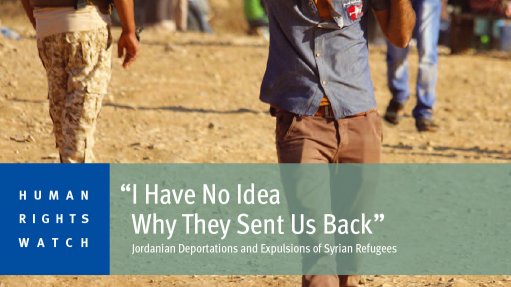
Despite a decades-long history of hospitality that has earned Jordan an international reputation as one of the world’s great refugee-hosting countries, since 2014, and especially in 2016 and 2017, Jordan has been marring that reputation by summarily deporting Syrian refugees. The authorities have been deporting refugees—including the collective expulsion of large families—without giving them a meaningful chance to challenge their removal and failing to consider their need for international protection. In the first five months of 2017, Jordanian authorities were deporting about 400 registered Syrian refugees per month, in addition to about 300 unorganised returns of registered refugees per month that appeared to be voluntary. Another 500 refugees per month were estimated as returning to Syria with little known about the circumstances of their return.
Collective expulsions and individual deportations of Syrian refugees spiked in mid-2016 and again in early 2017, according to an international humanitarian organisation. While summary deportations of individual refugees continue at present, fewer cases of extended families being deported were observed by mid-year 2017. However, refugees and international humanitarian workers told Human Rights Watch that family members are increasingly choosing ‘voluntary’ return after the head of household has been deported.
International humanitarian workers said they believed that increasing deportation rates, including the spikes in deportations, are connected to authorities’ response to armed attacks, either directly in reaction to the armed attacks themselves, or as an overall increase in security measures throughout the country following the attacks. These include an attack on Jordanian forces near the northeastern Rukban district in June 2016 that killed seven, and attacks around the southern city of Karak in December 2016 that killed 19. ISIS claimed responsibility for both attacks; Jordanian authorities have neither provided evidence that any deportees were involved in any of these attacks nor publicly alleged that they were involved.
Human Rights Watch interviewed 35 Syrian refugees in Jordan and an additional 13 Syrians by telephone whom Jordanian authorities had recently deported to Syria. Those whom authorities deported, or who knew or communicated with others who were deported, consistently said that authorities produced little evidence of wrongdoing before their removal. Jordanian officials also did not give any real opportunity to Syrian refugees to contest their removal or to seek legal help or the assistance of the UN High Commissioner for Refugees (UNHCR) prior to their deportation.
Report by the Human Rights Watch